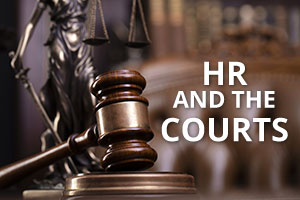by CUPA-HR | May 13, 2025
Each month, CUPA-HR General Counsel Ira Shepard provides an overview of several labor and employment law cases and regulatory actions with implications for the higher ed workplace. Here’s the latest from Ira.
Executive Orders Targeting Diversity, Equity and Inclusion Initiatives Are Subject to Conflicting Court Orders
On May 2, 2025, a federal district court judge in D.C. denied a request from civil rights groups for an injunction precluding the Trump administration’s executive orders aimed at curtailing DEI initiatives and cutting protections for transgender people. The judge denied the plaintiffs’ attempt to curtail three Trump administration executive orders, concluding that the plaintiffs would not ultimately succeed (National Urban League v. Trump (D.D.C. 1:25-cv-00471, Prelim. Inj. denied, 5/2/25)).
Separately, on April 14, 2025, a federal district court judge in Illinois issued a nationwide preliminary injunction, following his temporary restraining order of late March 2025, barring the U.S. Department of Labor from enforcing those parts of President Trump’s executive order that target diversity, equity and inclusion initiatives (Chicago Women in Trades v. Trump (2025 BL 125862, N.D. Ill. No. 1.25-cv-02005, 4/14/25)). This injunction is subject to appeal and possible modification by the U.S. Court of Appeals.
The March 2025 temporary restraining order also barred enforcement of the executive order provision requiring grant recipients, like the plaintiff, from having to certify that they do not operate programs that advance DEI. The judge noted that part of the executive order could chill speech even beyond federally funded programs but few grant recipients are likely to sue the federal government. Learn more.
Students File Multiple Lawsuits Contesting the Department of Homeland Security Cancellation of F-1 Status Without Due Process Hearings
At least a dozen lawsuits have been filed asking federal judges to block the Department of Homeland Security’s attempts to cancel F-1 status without proper hearing and cause. One Dartmouth doctoral student from China won an emergency order restoring his F-1 student status. According to the American Immigration Lawyers Association, more than 4,700 foreign students have had their records terminated by U.S. Immigration and Customs Enforcement (ICE) without any hearings or other due process. Lawsuits have been filed in New York, California, Michigan, Pennsylvania, New Hampshire and Washington state contesting the termination of student records. The lawsuits are asking the courts to block DHS from terminating student records and targeting the students for removal.
On April 4, CUPA-HR co-signed a letter with the American Council on Education and 14 other higher education associations seeking clarity on international student visa issues.
U.S. Department of Labor To Lose 20% of Its Workforce Due to Voluntary Resignations
More than 2,700 of the Department of Labor’s over 14,000 employees have accepted the department’s offer to receive pay and benefits through September if they voluntarily resign. The offer advised that there would be mandatory layoffs and job eliminations in the future. Commentators concluded that the staff resignations will decrease the DOL’s ability to perform on-site audits and enforcement of many worker protection laws that the department has the responsibility to enforce.
This exodus follows the Trump administration’s attempt to terminate many DOL probationary employees who were later reinstated by a court order following a challenge to the probationary terminations.
Trump Administration Issues Executive Order to Three Cabinet Agencies To Train 1 Million New Apprentices in Skilled Trades, Including Artificial Intelligence
The Trump administration issued an executive order on April 23, 2025, to secretaries of education, commerce, and labor to conduct a full-scale review of federal apprenticeship programs to identify areas for realignment and address training for in-demand skills. The goal is to have the three agencies develop a plan to train 1 million new apprentices in skilled trades and emerging industries, including artificial intelligence.
The executive order gives the three agencies 90 days to submit a report to the Office of Management and Budget. The report should include policy reforms and programs that could be retracted and consolidated between agencies. The order asks the agencies to identify ineffective programs and states that each “each identified program should be accompanied by a proposal to reform the program, redirect its funding, or eliminate it.”
Trump Administration Issues Executive Order Barring the EEOC and DOJ From Prosecuting Disparate Impact Theory Discrimination Cases
Federal agencies prosecuting discrimination bias cases are barred from using the disparate impact theory of unintentional discrimination under a new Trump administration executive order signed April 23, 2025. The order specifically directs the EEOC and DOJ to review their pending cases and investigations that rely on this legal theory and take appropriate action within 45 days (that is, drop or revise the case).
The U.S. Supreme Court recognized the disparate impact legal theory as appropriate enforcement of the Civil Rights Act of 1964, in its 1971 landmark decision in Griggs v. Duke Power. Notwithstanding the Trump executive order, private individuals can still bring private claims of discrimination under Title VII using the disparate impact theory, until the Griggs case is reversed or modified.
Because of the unprecedented and fast-changing pronouncements of the new presidential administration and the intervening court challenges, the developments contained in this blog post are subject to change. Before acting on the legal issues discussed here, please consult your college or university counsel and, as always, act with caution.

